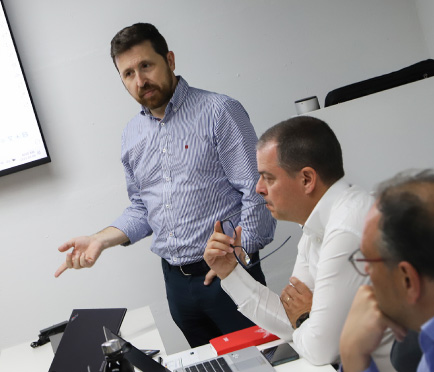Do you already have management software in your company but feel that the current solution is falling short of your needs? The idea of changing ERP doesn’t come overnight. On the contrary: gradually, small failures, inefficiencies, and limitations start to accumulate, negatively impacting your business management. Read our article to learn the main reasons to change ERP, the best time to do it, and how to implement an action plan.
The reasons that lead to the need to change ERP can be of various kinds, and often the reasons can even be positive. Has the business grown, or have new product and service lines been created? Are you planning to internationalize your company? Is the management software you adopted not intuitive for your employees, or have its features become obsolete? Are you concerned about issues related to information security? Remember that whenever there are changes in your industry or sector, it’s essential that the ERP keeps up, or it risks becoming outdated and inefficient.
Some argue that without periodic reviews and adjustments made by the implementation partner, an ERP can become obsolete within 5 to 10 years. However, this interval also varies from case to case. These are some of the main reasons that lead to the need to change management software in companies.
5 Reasons to Change ERP
Company Growth
Business growth often leads to management tools no longer adequately meeting managers’ needs. Growth can mean more buying and selling processes, a higher number of orders, new products or services, new markets, among others. All this implies the creation of new processes within the company, which should also be part of the ERP system.
Merger or Acquisition of Companies
It may also be important to change ERP when there are mergers or acquisitions of companies. If that’s your case, the current management software may not have all the essential features to respond to the change. Thus, in this situation, you should assess whether it’s important to upgrade or even switch to an ERP that can meet the business needs in the short, medium, and long term.
Outdated Technology and Security Flaws
Nowadays, technological changes sometimes occur at dizzying speeds. What worked in the past can quickly become unsuitable, and if your ERP doesn’t have frequent updates, the solution can not only become obsolete but also counterproductive – this happens if, for example, you need a lot of time to analyze and mitigate platform errors, which can lead to a loss of competitiveness for your company.
On the other hand, it’s essential that company data is always secure. If you suspect there are threats to the integrity of the information, you should contact a qualified partner, such as PONTUAL, to analyze the security of your ERP and make the necessary changes, safeguarding the confidentiality of the information and preventing your company’s credibility in the market from being at risk. This change may involve complementing the current ERP solution with additional tools or a complete change of management software.
Inefficient Support from the Service Provider
Support and technical assistance needs must be promptly ensured by the company responsible for implementing the management software. If you feel that the partner company is not proactive enough or quick in responding to support requests, or if the training provided to your company’s employees is insufficient, it may be time to change ERP (and provider!).
Limited Scalability Solution
Scalability is one of the most important features of an ERP, regardless of the sector. Scalability refers to the software’s ability to adapt to business growth, meeting new needs without constraints on the company’s activities. A poorly scalable ERP system can quickly stop meeting needs and force a change.
A good management software solution provider can not only indicate the most suitable solution and its scalability but also, when necessary, the integration of systems, the development of add-ons for the ERP, among other services that allow you to benefit from a fully integrated and streamlined IT ecosystem.
These are some of the main reasons identified by managers that trigger the process of changing ERP in companies. However, there are others. Analyze the topics below and, if you find yourself in some of these situations and there’s no other solution in sight, it may be important to consider changing ERP:
- I use multiple databases in my company.
- My employees complain that the ERP is too complex and have created parallel processes for information recording.
- I use several independent software systems that lack integration.
- The reasons I acquired my ERP are no longer valid today.
- My employees did not receive adequate training to use the ERP.
- I don’t have access to adequate support or technical documentation to help solve ERP problems.
Have you decided it’s really time to change management software? Where can you start, and what aspects should you consider? Timing issues are also important, as implementing a new ERP involves time and team availability.
When to Change ERP
Let’s start by looking at times when you shouldn’t start the ERP change process.
Ensure that the teams involved in the process are available and not going through a peak workload. It’s also essential that key project members are not absent or on vacation. Departments like sales, marketing, or human resources and administration usually have relevant inputs about their needs that impact ERP customization, so make sure the schedule of those involved is more open for this activity.
The finance department is particularly affected by periods of higher workload, such as year-end account closings. Seasonal businesses require greater efforts from sales and marketing teams at certain times of the year, like summer or Christmas, so if this is your case and you’re considering changing management software at that time, it may be better to reassess your decision.
Once you achieve the (arduous) task of reconciling team availability, it’s time to start the change!
Implement an Action Plan to Change ERP
Assess your Needs
Have you ever thought about buying a pair of shoes without knowing your shoe size? With an ERP, it’s not that different. If you don’t have a deep understanding of your needs, it will be more difficult to choose the right solution.
Start by recording what the business needs are – yours and those of your employees and company departments. You can conduct brief interviews to gather this information if necessary. Also, identify specific processes, requirements of your sector, and what tools and skills are needed to address them.
Choose an ERP Adapted to your Sector
As obvious as it may seem, business managers don’t always choose management software adapted to their sector. By opting for a generic ERP solution, these managers may be investing money and resources in a tool that won’t be adapted to the business needs. An industrial software will certainly have different modules and features than an ERP for the retail area or even management software for health clinics, so keep this factor in mind when planning the change.
Choose a Reputable Implementation Partner
An ERP is a tool with great potential for improving company processes and results. However, the solution implementation project is not exempt from possible failures, poor communication with the partner, lack of team training, and/or inefficient support.
PONTUAL has a team of ERP consultants with 30 years of market experience and a portfolio of solutions for various sectors. From standard tools to the highest level of customization, we implement solutions for hundreds of clients and accompany the entire process, from planning to project delivery, including training and support.
Contact us for more information!





